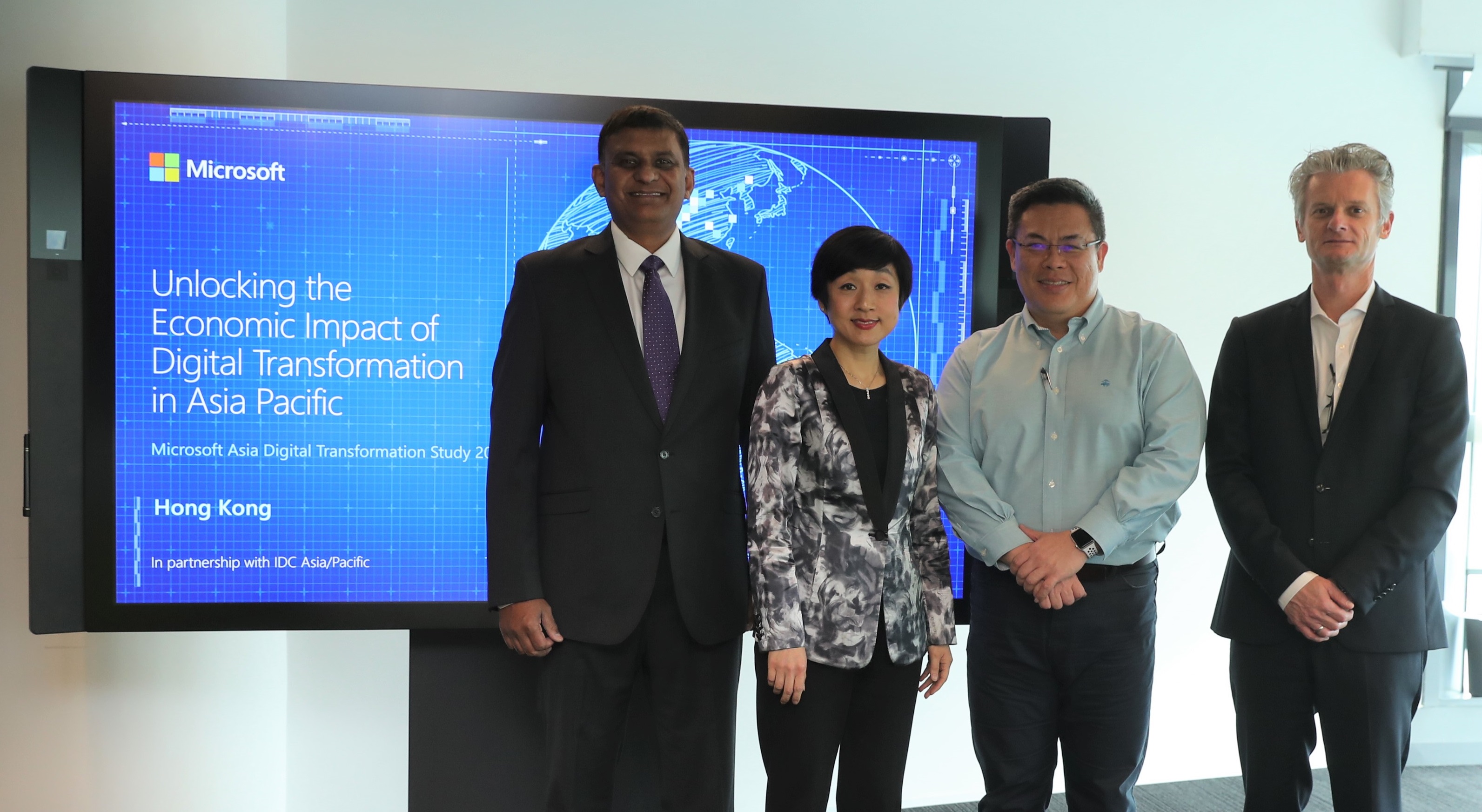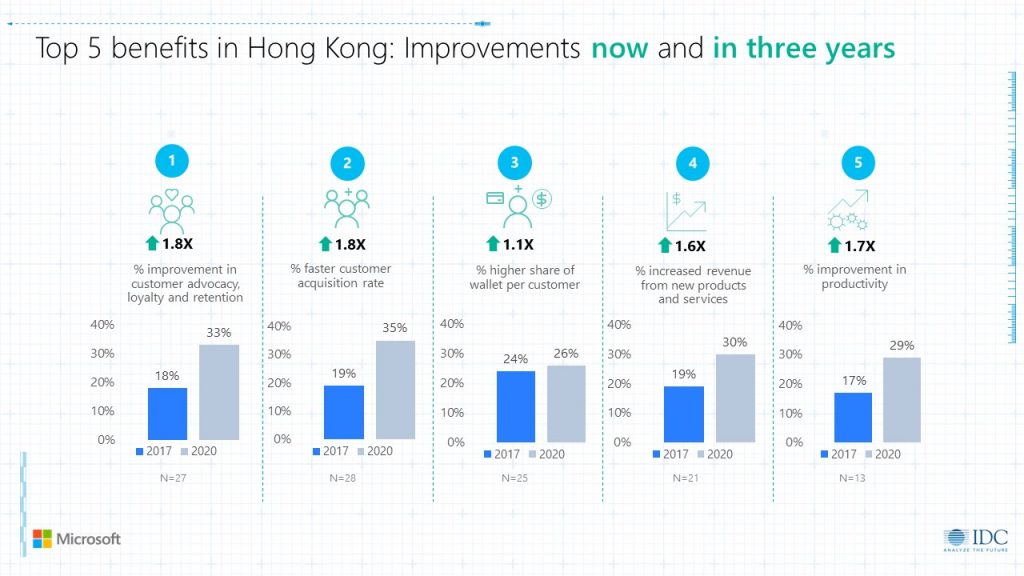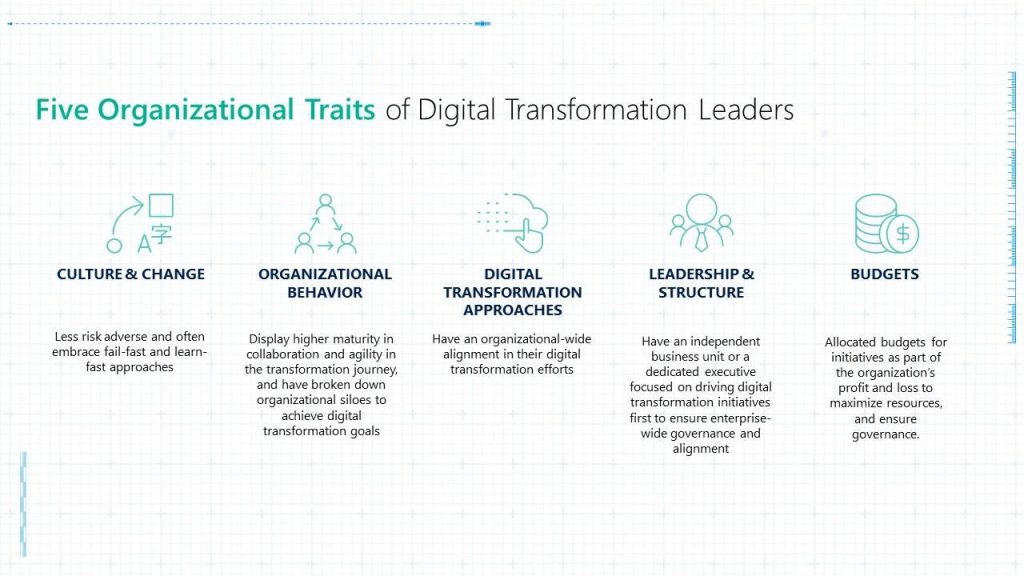- IDC study commissioned by Microsoft predicts that approximately 60% of Hong Kong’s GDP will be derived from digital products or services by 2021
- Digital transformation has improved customer advocacy, faster customer acquisition rate, increased share of wallet of customer, revenue from new products & services and productivity. These benefits will also improve by up to 80% in three years
- Leaders in digital transformation reap double the benefits compared to Followers
- Digital transformation in Hong Kong will benefit citizens with stronger community cohesion, as well as smarter, safer and more efficient cities
20 April 2018 Hong Kong – By 2021, digital transformation will add an estimated US$9 billion to Hong Kong’s GDP, and increase the growth rate by 0.5% annually, according to a new business study released today. The research, “Unlocking the Economic Impact of Digital Transformation in Asia Pacific[1]”, was produced by Microsoft in partnership with IDC Asia/Pacific.
The study predicts a dramatic acceleration in the pace of digital transformation across Asia Pacific’s economies. In 2017, about 5% of Hong Kong’s GDP was derived from digital products and services created directly through the use of digital technologies, such as mobility, cloud, Internet of Things (IoT), and artificial intelligence (AI). This is expected to surge to around 60% of Hong Kong’s GDP by 2021.
The survey conducted with 1,560 business decision makers in mid and large-sized organizations across 15 economies in the region highlights the rapid impact and widespread disruption that digital transformation is having on traditional business models.
“Digital transformation has a positive and measurable impact on Asia Pacific’s economy, and it is widely regarded that every organization needs to be a digital one. In fact, organizations are seeing tangible improvements from their digital transformation initiatives today between the ranges of 17% to 24% today, which shows that digital transformation is no longer an idea, but a reality,” said Ralph Haupter, President, Microsoft Asia and Corporate Vice-President, Microsoft.
The study, which included 100 respondents from Hong Kong, identified five key benefits to their bottom line from digital transformation:
Business leaders expect to up to 80% improvements in those key areas by 2020, with the biggest jump expected in customer advocacy and customer acquisition rate.
“We see AI as a primary catalyst for further growth. Our customers across Asia are already demonstrating a strong sense of urgency to integrate AI into their business as part of their digital transformation initiatives. The Study shows that AI is top of mind when it comes to investing in emerging technologies today,” said Ralph Haupter, President, Microsoft Asia and Corporate Vice-President, Microsoft.
By 2019, IDC predicts that 40% of digital transformation initiatives will be supported by Artificial Intelligence/Cognitive capabilities[2] providing timely, critical insights for new operating and monetization models in Asia Pacific (excluding Japan).
Accelerate Digital Transformation with adoption of AI
TNG Wallet is Hong Kong’s most popular e-Wallet, providing the Next Generation financial services to the general public as well as the 1.2 billion unbanked population in Asia. As of today, its services cover Hong Kong and 13 countries, with a network of 852 banks and over 183,000 cash pick-up points.
“We are running Linux Virtual Machine on Azure, a trustable environment for us to run our business and provide innovative solutions to customers, which is particularly important for Financial services sector. With AI supported by OpenSource, we can analyse data captured from in-app customer care Chatbot by backend algorithms for any potential problems, and the Chatbot will pop up proactively to offer assistance to users. We are also conducting a proof of concept with Machine Learning to forecast foreign exchange rates. It is expected to analyze rates and admin fees for different exchange companies to optimize the route and time in exchange corridors. These technologies will enable us to make smarter decisions and drive business growth.” said Alex Kong, Founder and CEO of TNG Wallet. “Our future plan is to upgrade TNG 4.0 with face and voice authentication with enhanced AI capabilities, enabling users to conduct frictionless money transfer in different places and currencies to capture one-belt, one-road opportunities.“
Digital Leaders in Asia Pacific to Gain Lion’s Share of Economic Opportunities
While 80% of organizations in Hong Kong are in the midst of their digital transformation journey, only 7% can be classified as Leaders. These are organizations that have full or progressing digital transformation strategies, with at least a third of their revenue from digital products and services. In addition, these companies are seeing between 20-30% improvements in benefits across various business areas from their initiatives.
The Study indicates that Leaders experience double the benefits of followers, and these improvements will be more pronounced by 2020. Almost half of Leaders (48%) have a full digital transformation strategy in place.
“The pace of Digital Transformation is accelerating, and IDC expect that by 2021, at least 60% of Hong Kong’s GDP will be digitalized, with growth in every industry driven by digitally-enhanced offerings, operations and relationships. The study shows leaders seeing double the benefits of followers, with improvements in productivity, cost reductions, and customer advocacy. To remain competitive, organizations must establish new metrics, realign organization structures, and rearchitect their technology platform,” said Avneesh Saxena, Group Vice President, Domain Research Group, IDC Asia/Pacific.
The Study identified key differences between leaders and others in Asia Pacific, which contribute to the improvements tracked:
- Leaders are more concerned about competitors and emergence of disruptive technologies: The digital economy has also given rise to new types of competitors, as well as emerging technologies such as Artificial Intelligence that have contributed to the disruption of business models.
- Business agility and culture of innovation are key goals: When addressing business concerns, leaders are focused on creating a culture of agility and innovation to counter competition Followers, on the other hand, are more focused on improving employee productivity and profitability.
- Measuring digital transformation successes: Organizations across Asia Pacific are starting to adopt new key performance indicators (KPI) to better measure their digital transformation initiatives, such as effectiveness of processes, data as a capital, and customer advocacy in the form of Net Promoter Score (NPS). As organizations realize the potential of data as the new oil for the digital economy, leaders are much more focused on leveraging data to grow revenue and productivity, and to transform business models.
- Leaders are more aware of challenges in their digital transformation journeys: In addition to skills and cybersecurity threats as key challenges, Leaders have also identified the need to bolster their data capabilities through the use of advanced analytics to develop actionable insights in fast-moving markets.
- Leaders are looking to invest in AI and Internet of Things: Emerging technologies such as AI (including cognitive services and robotics) and IoT are areas where leaders are investing in for 2018. Besides these emerging technologies, leaders are also more interested in investing in big data analytics to mine data for actionable insights than others.
What sets leaders apart from others are their abilities to ride on the digital transformation wave from an organizational culture perspective. The Study found that leaders have these traits:
“For organizations to gain the benefits of digital transformation, they need to develop a data-driven culture and build up a strong digital ecosystem – from employees, to customers, to partners. This will grow a value chain by gaining new insights through new data sources, expanding their digital products and services, and ultimately building their data as a capital asset,” said Ralph Haupter, President, Microsoft Asia and Corporate Vice-President, Microsoft. “Microsoft is uniquely positioned to help organizations in Asia to succeed in their digital transformation journeys today through our agile platforms and solutions that prioritize flexibility, integration and trust. As an organization that has also undergone digital transformation, we understand what organizations will need to make their journeys successful.”
Digital Transformation in Hong Kong Will Ultimately Benefit Citizens
According to the business leaders surveyed, digital transformation will deliver three top social benefits:
- Build social cohesion through social interaction, access to correct information
- Smarter, safer and more efficient cities
- Improved quality of education through better teaching tools
“The study found that 79% of jobs in Hong Kong will be transformed in the next three years, 60% of which will be redeployed to higher value roles, or reskilled to meet the need of the digital age. And, what is encouraging is that 48% of respondents are confident that their young employees already have future ready skills that will help them to transition to new roles.” said Cally Chan, General Manager, Microsoft Hong Kong.
While there is also concern about job displacement, the Study found that 23% of new jobs are expected to be created from digital transformation, which is about the same number to be automated, or about 19%; in other words, the effect will be slightly positive.
“Despite the impact on jobs being mitigated, organizations should still work on partnering with governments and education institutions to provide feedback, training and reskilling programs so that the workforce is equipped with future-ready skill sets. In Hong Kong, we are launching the new AI Certification programme with different tracks covering AI, big data, and data analytics to enable all workforce to acquire data science knowledge for career development.” added Cally.
Riding the Wave of Digital Transformation
Organizations in Asia Pacific need to accelerate their digital transformation journey to reap the full benefits from their initiatives, and to address the invisible revolution brought by the mass adoption of AI.
Microsoft recommends organizations to adopt the following strategies to become a digital transformation Leader:
- Create a digital culture: An organization needs to build a culture of collaboration where it is connected across business functions. It should have a data strategy in place and begin with the end in mind, having a plan with clear outcomes. Importantly, a proper data strategy will allow businesses to start their AI initiatives to identify connections, insights and trends. Data capitalization would be key for all organizations to succeed in the digital economy.
- Build a digital ecosystem: Digital transformation will not be optimized if organizations do not collaborate with their external customers and partners. The key to becoming a leader is for organizations to enable data sharing and collaboration internally and externally in an open yet trusted manner.
- Embrace micro-revolutions: In most cases, digital transformation efforts do not start with widespread change, but a series of micro-revolutions. These are small, quick projects that deliver positive business outcomes and accrue to bigger and bolder digital transformation initiatives.
- Bet big on AI: Organizations need to integrate AI into its business and identify areas where it can be used to augment higher-value activities.
- Develop Future Ready Skills for Individuals and Organizations: Organizations today must relook at training and reskilling its workforce so that workers are equipped with future ready skill sets such as complex problem solving, critical thinking and creativity for the digital economy. More importantly, they need to rebalance the workforce to attain and attract key digital talents, as well as be open in creating a flexible work source model where they tap into skills-based marketplace. From a digital skills perspective, LinkedIn’s latest study[3] outlines the ABCs of digital talents required for future economies in the region – artificial intelligence, big data and cloud computing. In Hong Kong, the top in-demand skills are big data, software and user testing, as well as mobile development.
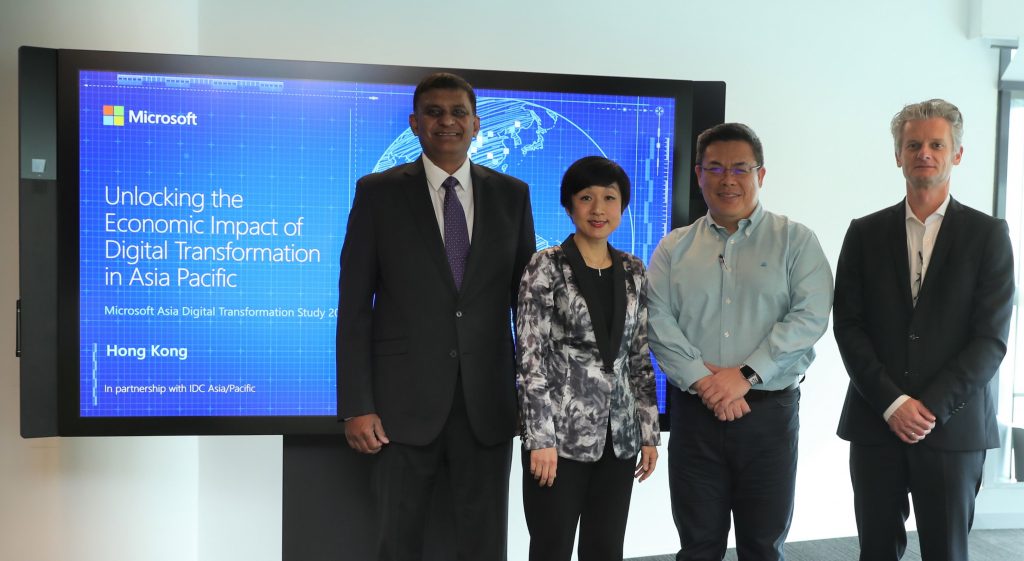
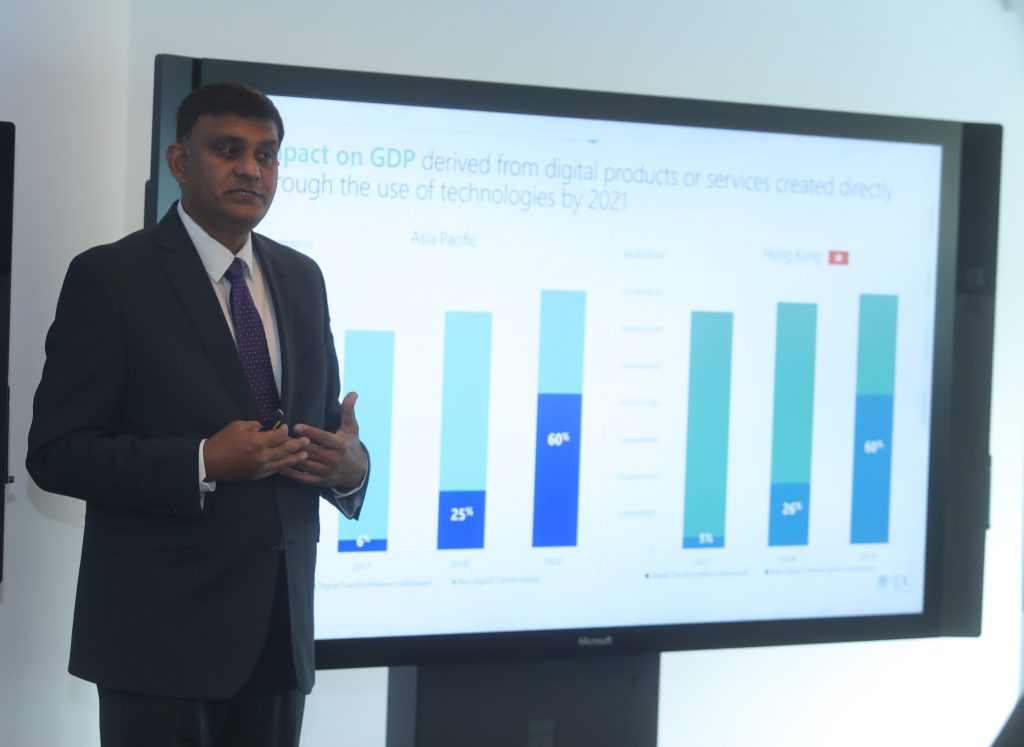
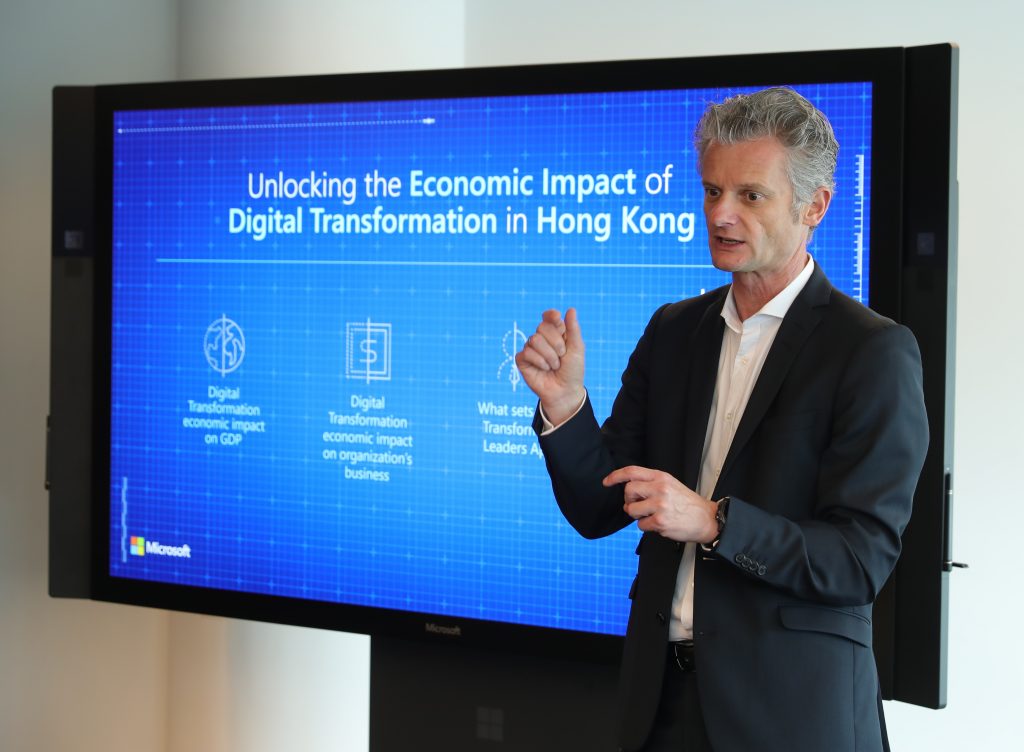
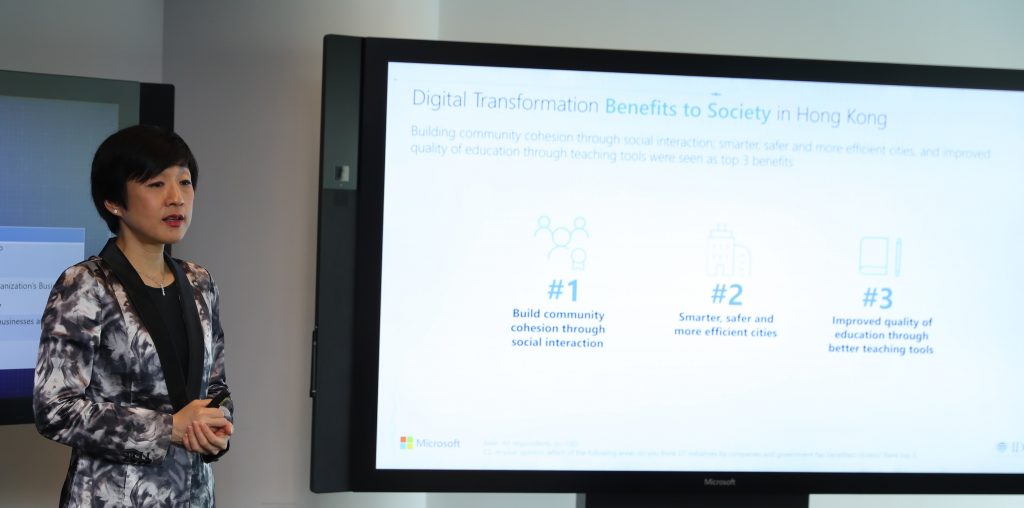
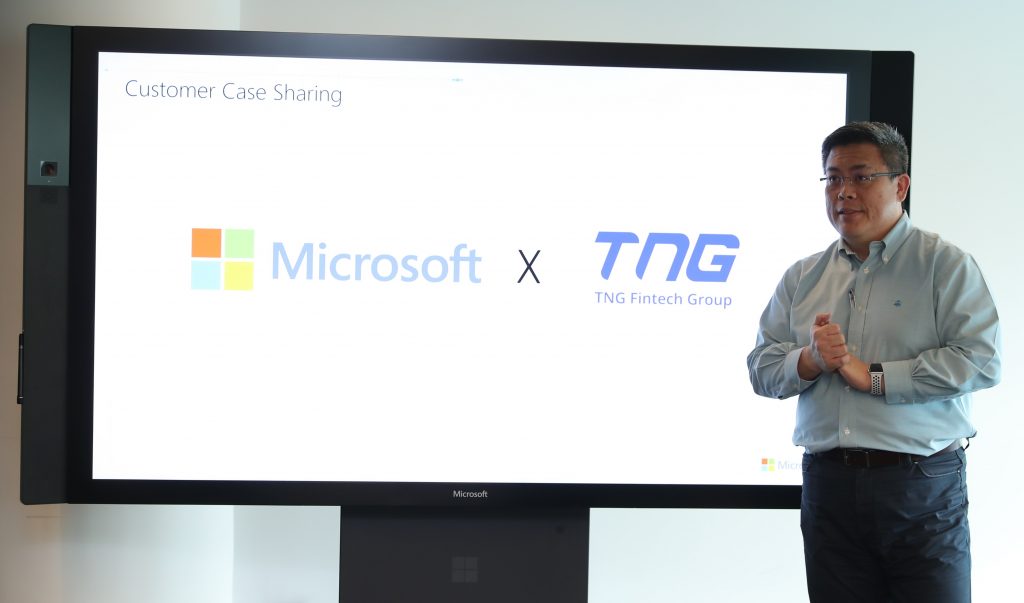
###
About Microsoft
Microsoft (Nasdaq “MSFT” @microsoft) enables digital transformation for the era of an intelligent cloudand an intelligent edge. Its mission is to empower every person and every organization on the planet to achieve more.
For more information, please contact:
Microsoft Hong Kong
Chin Tang Chin
(852) 2804-4266
[email protected]
BlueCurrent for Microsoft
Winyee Lai
(852) 2584-7884
[email protected]
For more inquiries on the findings of this report, please contact:
IDC Asia/Pacific
Avneesh Saxena
[email protected]
[1] Unlocking the Economic Impact of Digital Transformation in Asia Pacific conducted with 1,560 respondents in 15 markets:
- 15 Asia Pacific markets were involved: Australia, China, Hong Kong, Indonesia, India, Japan, Korea, Malaysia, New Zealand, Philippines, Singapore, Sri Lanka, Taiwan, Thailand and Vietnam.
- Business and IT leaders from organizations with more than 250 staff were polled.
- Industries polled included education, financial services, government, healthcare, manufacturing and retail.
- Respondents are decision makers involved in shaping their organizations’ digital strategy.
[2] IDC, IDC FutureScape: Digital Transformation 2018 Predictions – Asia/Pacific (Excluding Japan) Implications
[3] LinkedIn, The Digital Workforce of the Future. Data as of August 2017.

